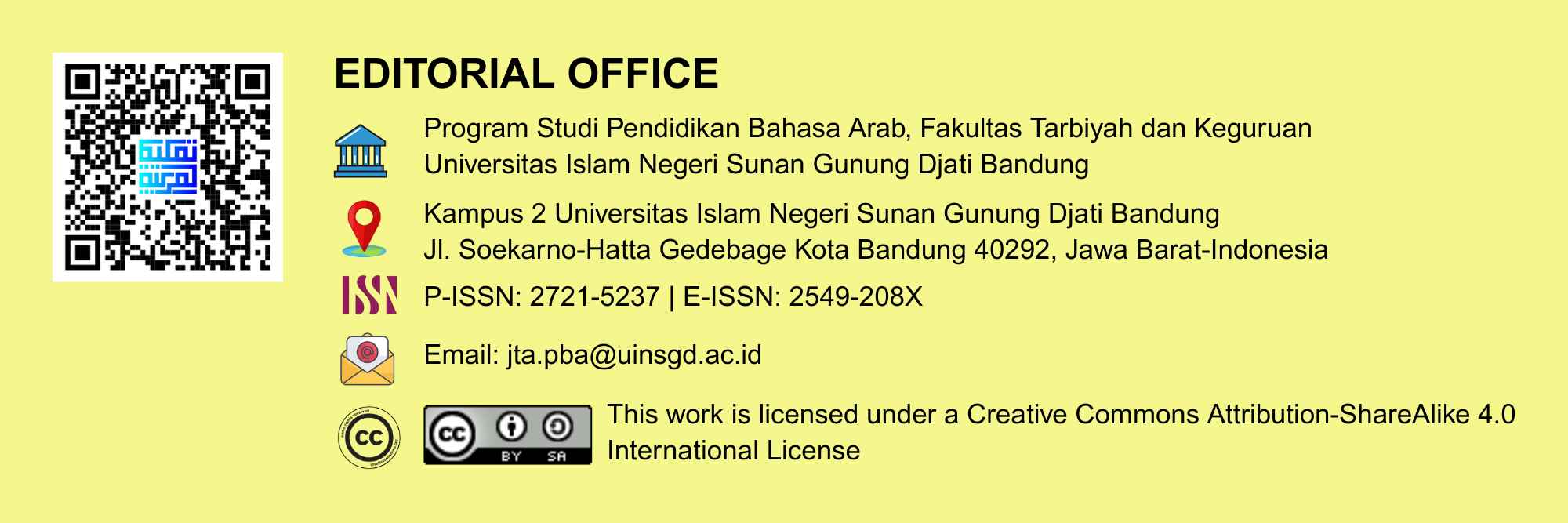The application of Albert Bandura's Social Cognitive Theory: A Process in Learning Speaking Skill
DOI:
https://doi.org/10.15575/jpba.v5i2.12945Abstract
References
Abdullah, S. M. (2019). Social Cognitive Theory: A Bandura Thought Review Published In 1982-2012. Psikodimensia, 18(1), 85–100. Https://Doi.Org/10.24167/Psidim.V18i1.1708
Adi, H. M. M. (2020). Teori Belajar Behaviorisme Albert Bandura Dan Implikasinya Dalam Pembelajaran Bahasa Arab. لسـانـنـا (Lisanuna): Jurnal Ilmu Bahasa Arab Dan Pembelajarannya, 10(1), 22–31. Https://Doi.Org/10.22373/Ls.V10i1.7803
Andjarwati, T. (2015). Motivasi Dari Sudut Pandang Teori Hirarki Kebutuhan Maslow, Teori Dua Faktor Herzberg, Teori X Y Mc Gregor, Dan Teori Motivasi Prestasi Mc Clelland. Jmm17, 2(01), Article 01. Https://Doi.Org/10.30996/Jmm17.V2i01.422
Callaway, J. L. (2020). Using Social Cognitive Theory To Teach Radiographic Positioning. Radiologic Technology, 91(3), 300–302.
Darmawati, E. (2020). Social Interaction & Natural Environment Based Learning. Zirah, 1(2), 127–136.
Efendi, E., & Wahyudi, H. F. (2021). Gegar Budaya Mahasantri Dalam Perspektif Albert Bandura. Edumaspul: Jurnal Pendidikan, 5(1), 365–375. Https://Doi.Org/10.33487/Edumaspul.V5i1.1222
Grenner, E., Ã…kerlund, V., Asker-Ãrnason, L., Weijer, J. Van De, Johansson, V., & Sahlén, B. (2020). Improving Narrative Writing Skills Through Observational Learning: A Study Of Swedish 5th-Grade Students. Educational Review, 72(6), 691–710. Https://Doi.Org/10.1080/00131911.2018.1536035
Gunawan, G., Suranti, N. M. Y., & Fathoroni, F. (2020). Variations Of Models And Learning Platforms For Prospective Teachers During The Covid-19 Pandemic Period. Indonesian Journal Of Teacher Education, 1(2), 61–70.
Ilmiani, A. M., Ahmadi, A., Rahman, N. F., & Rahmah, Y. (2020). Multimedia Interaktif Untuk Mengatasi Problematika Pembelajaran Bahasa Arab. Al-Ta’rib Jurnal Ilmiah Program Studi Pendidikan Bahasa Arab, 8(1), 17–32.
Lesilolo, H. J. (2018). Penerapan Teori Belajar Sosial Albert Bandura Dalam Proses Belajar Mengajar Di Sekolah. Kenosis: Jurnal Kajian Teologi, 4(2), 186–202. Https://Doi.Org/10.37196/Kenosis.V4i2.67
Marhayati, N., Chandra, P., & Fransisca, M. (2020). Pendekatan Kognitif Sosial Pada Pembelajaran Pendidikan Agama Islam. Dayah: Journal Of Islamic Education, 3(2), 250. Https://Doi.Org/10.22373/Jie.V3i2.7121
Mierowsky, R., Marcus, N., & Ayres, P. (2020). Using Mimicking Gestures To Improve Observational Learning From Instructional Videos. Educational Psychology, 40(5), 550–569. Https://Doi.Org/10.1080/01443410.2019.1650896
Nabavi, R. T. (N.D.). Bandura’s Social Learning Theory & Social Cognitive Learning Theory. 24.
Nemati Lafmejani, S., Alipour-Hafezi, M., Babalhavaeji, F., Hariri, N., & Fahimnia, F. (//10). Developing A Framework For Interactive Information Retrieval Of Digital Libraries Based On Bandura’s Social-Cognitive Theory. Iranian Journal Of Information Processing And Management, 552–552.
Renninger, K. A., & Bachrach, J. E. (2015). Studying Triggers For Interest And Engagement Using Observational Methods. Educational Psychologist, 50(1), 58–69. Https://Doi.Org/10.1080/00461520.2014.999920
Rosada, B., & Amrulloh, M. A. (2018). Metode Pembelajaran Qiraâ€Tmah Persepektif Teori Kognitif Sosial Albert Bandura (Studi Kasus Di Smp Muhammadiyah 2 Yogyakarta). Tarbawi : Jurnal Pendidikan Islam, 15(1), Article 1. Https://Doi.Org/10.34001/Tarbawi.V15i1.719
Rumjaun, A., & Narod, F. (2020). Social Learning Theory—Albert Bandura. In B. Akpan & T. J. Kennedy (Eds.), Science Education In Theory And Practice: An Introductory Guide To Learning Theory (Pp. 85–99). Springer International Publishing. Https://Doi.Org/10.1007/978-3-030-43620-9_7
Silahudun, A. (2020). Evaluasi Pembelajaran Bahasa Arab Dalam Terapan Teori Kognitif Social Albert Bandura. Al - Misbah ( Jurnal Prodi Pgmi), 6(1), 193–202.
Stanley, M. J., Banks, S., Matthew, W., & Brown, S. (2020). Operationalization Of Bandura’s Social Learning Theory To Guide Interprofessional Simulation. Journal Of Nursing Education And Practice, 10(10), 61. Https://Doi.Org/10.5430/Jnep.V10n10p61
Suwartini, S. (2016). Teori Kepribadian Social Cognitive: Kajian Pemikiran Albert Bandura Personality Theory Social Cognitive: Albert Bandura. Al-Tazkiah : Jurnal Bimbingan Dan Konseling Islam, 5(1), 37–46. Https://Doi.Org/10.20414/Altazkiah.V5i1.1325
Utama, M. F. C. (2020). Peningkatan Minat Belajar Muhadatsah Melalui Video Animasi Di Kelas X Al-Izzah Batu [Undergraduate, Universitas Muhammadiyah Malang]. Http://Eprints.Umm.Ac.Id/71466/
Yanuardianto, E. (2019). Teori Kognitif Sosial Albert Bandura (Studi Kritis Dalam Menjawab Problem Pembelajaran Di Mi). Auladuna : Jurnal Prodi Pendidikan Guru Madrasah Ibtidaiyah, 1(2), 94–111. Https://Doi.Org/10.36835/Au.V1i2.235
Downloads
Published
How to Cite
Issue
Section
Citation Check
License
Authors who publish in Ta'lim al-'Arabiyyah: Jurnal Pendidikan Bahasa Arab dan Kebahasaaraban agree to the following terms:
- Authors retain copyright and grant the journal right of first publication with the work simultaneously licensed under a Creative Commons Attribution-ShareAlike 4.0 International (CC BY-SA 4.0) License that allows others to share the work with an acknowledgment of the work's authorship and initial publication in this journal.
- Authors are able to enter into separate, additional contractual arrangements for the non-exclusive distribution of the journal's published version of the work (e.g., post it to an institutional repository or publish it in a book), with an acknowledgment of its initial publication in this journal.
- Authors are permitted and encouraged to post their work online (e.g., in institutional repositories or on their website) prior to and during the submission process, as it can lead to productive exchanges, as well as earlier and greater citation of published work (See The Effect of Open Access).
![]()
Ta'lim al-'Arabiyyah: Jurnal Pendidikan Bahasa Arab dan Kebahasaaraban is licensed under a Creative Commons Attribution-ShareAlike 4.0 International License.
Based on a work at https://journal.uinsgd.ac.id/index.php/Talim








